中小学教师职业行为十项准则
新时代中小学教师职业行为十项准则共6页
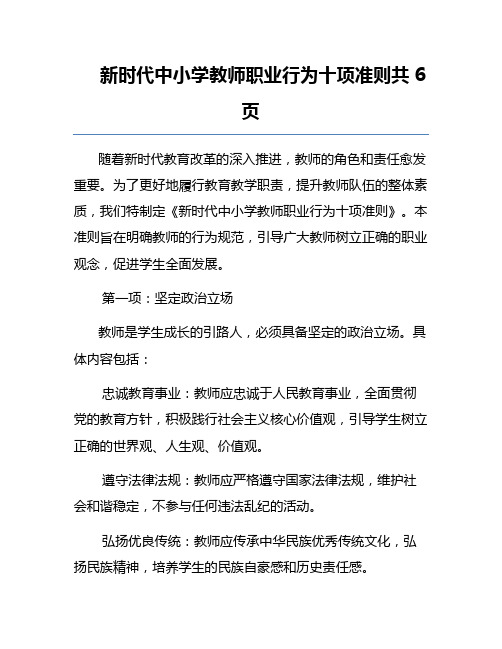
新时代中小学教师职业行为十项准则共6页随着新时代教育改革的深入推进,教师的角色和责任愈发重要。
为了更好地履行教育教学职责,提升教师队伍的整体素质,我们特制定《新时代中小学教师职业行为十项准则》。
本准则旨在明确教师的行为规范,引导广大教师树立正确的职业观念,促进学生全面发展。
第一项:坚定政治立场教师是学生成长的引路人,必须具备坚定的政治立场。
具体内容包括:忠诚教育事业:教师应忠诚于人民教育事业,全面贯彻党的教育方针,积极践行社会主义核心价值观,引导学生树立正确的世界观、人生观、价值观。
遵守法律法规:教师应严格遵守国家法律法规,维护社会和谐稳定,不参与任何违法乱纪的活动。
弘扬优良传统:教师应传承中华民族优秀传统文化,弘扬民族精神,培养学生的民族自豪感和历史责任感。
第二项:恪守职业道德教师职业道德是教师职业行为的基石。
具体内容包括:尊重学生:教师应尊重学生的人格尊严,关心学生的身心健康,不歧视、不侮辱、不体罚学生。
为人师表:教师应以身作则,做到言行一致,树立良好的师德形象,为学生树立榜样。
廉洁自律:教师应廉洁自律,不收受学生或家长的财物,不利用职务之便谋取私利。
第二页第三项:严谨治学教师是知识的传播者,严谨治学是教师的基本要求。
具体内容包括:勤奋学习:教师应不断学习,充实自己的专业知识和教育教学能力,提高教育教学质量。
科学施教:教师应运用科学的教育教学方法,因材施教,激发学生的学习兴趣和潜能。
创新教育:教师应积极探索教育教学改革,勇于创新,推动教育事业发展。
第四项:关爱学生关爱学生是教师的基本职责。
具体内容包括:关心学生成长:教师应关心学生的全面发展,关注学生的身心健康,指导学生解决生活和学习中的困难。
关注学生个体差异:教师应尊重学生的个体差异,关注学生的个性特点,提供个性化的教育服务。
建立和谐师生关系:教师应建立和谐的师生关系,营造良好的教育环境,促进学生健康成长。
第三页第五项:规范教育教学行为教师的教育教学行为直接关系到教育质量。
中小学教师职业行为十项准则口诀
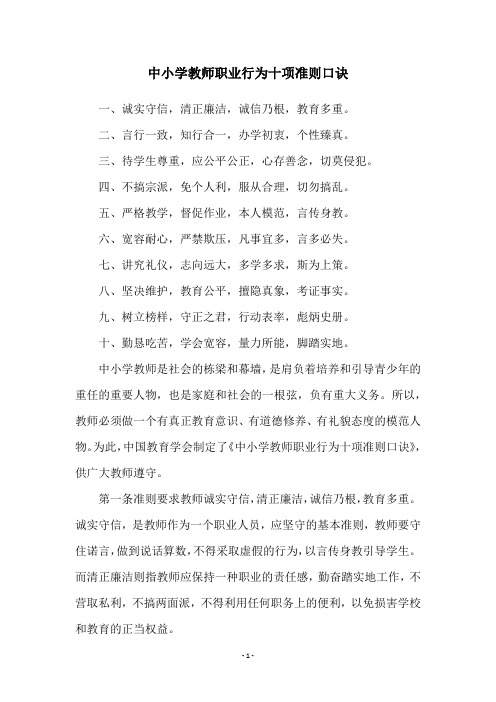
中小学教师职业行为十项准则口诀一、诚实守信,清正廉洁,诚信乃根,教育多重。
二、言行一致,知行合一,办学初衷,个性臻真。
三、待学生尊重,应公平公正,心存善念,切莫侵犯。
四、不搞宗派,免个人利,服从合理,切勿搞乱。
五、严格教学,督促作业,本人模范,言传身教。
六、宽容耐心,严禁欺压,凡事宜多,言多必失。
七、讲究礼仪,志向远大,多学多求,斯为上策。
八、坚决维护,教育公平,擅隐真象,考证事实。
九、树立榜样,守正之君,行动表率,彪炳史册。
十、勤恳吃苦,学会宽容,量力所能,脚踏实地。
中小学教师是社会的栋梁和幕墙,是肩负着培养和引导青少年的重任的重要人物,也是家庭和社会的一根弦,负有重大义务。
所以,教师必须做一个有真正教育意识、有道德修养、有礼貌态度的模范人物。
为此,中国教育学会制定了《中小学教师职业行为十项准则口诀》,供广大教师遵守。
第一条准则要求教师诚实守信,清正廉洁,诚信乃根,教育多重。
诚实守信,是教师作为一个职业人员,应坚守的基本准则,教师要守住诺言,做到说话算数,不得采取虚假的行为,以言传身教引导学生。
而清正廉洁则指教师应保持一种职业的责任感,勤奋踏实地工作,不营取私利,不搞两面派,不得利用任何职务上的便利,以免损害学校和教育的正当权益。
第二条准则要求教师言行一致,知行合一,办学初衷,个性臻真。
教师的行为要与言论一致,不能言而不行,行为习惯要与办学初衷一致,具有自己的性格,做到真诚坦荡、诚恳真挚。
第三条准则要求教师待学生尊重,应公平公正,心存善念,切莫侵犯。
教师要以孩子为中心,从他们的角度出发,以谦恭有礼的态度,尊重学生,以公平公正的态度,给予学生正确的价值观,不可利用职务之便,对学生进行侵犯,以身作则,树立良好的教育榜样。
第四条准则要求教师不搞宗派,免个人利,服从合理,切勿搞乱。
教师在行使职责时,不得以宗派、种族、性别等个人利益为理由,不应盲从时俗,而应服从合理、正当权利和责任,以免给学校带来混乱。
中小学教师职业行为十项准则

中小学教师职业行为十项准则教师是人类灵魂的工程师,是人类文明的传承者。
长期以来,广大教师贯彻党的教育方针,教书育人,呕心沥血,默默奉献,为国家发展和民族振兴作出了重大贡献。
对广大教师落实立德树人根本任务提出新的更高要求,为进一步增强教师的责任感、使命感、荣誉感,规范职业行为,明确师德底线,引导广大教师努力成为有理想信念、有道德情操、有扎实学识、有仁爱之心的好老师,着力培养德智体美劳全面发展的社会主义建设者和接班人,特制定以下准则。
一、坚定拥护中国共产党的领导,贯彻党的教育方针;不得在教育教学活动中及其他场合有损害党中央权威、违背党的路线方针政策的言行。
二、自觉爱国守法。
忠于祖国,忠于人民,恪守宪法原则,遵守法律法规,依法履行教师职责;不得损害国家利益、社会公共利益,或违背社会公序良俗。
三、传播优秀文化。
带头践行社会主义核心价值观,弘扬真善美,传递正能量;不得通过课堂、论坛、讲座、信息网络及其他渠道发表、转发错误观点,或编造散布虚假信息、不良信息。
四、潜心教书育人。
落实立德树人根本任务,遵循教育规律和学生成长规律,因材施教,教学相长;不得违反教学纪律,敷衍教学,或擅自从事影响教育教学本职工作的兼职兼薪行为。
五、关心爱护学生。
严慈相济,诲人不倦,真心关爱学生,严格要求学生,做学生良师益友;不得歧视、侮辱学生,严禁虐待、伤害学生。
六、加强安全防范。
增强安全意识,加强安全教育,保护学生安全,防范事故风险;不得在教育教学活动中遇突发事件、面临危险时,不顾学生安危,擅离职守,自行逃离。
七、坚持言行雅正。
为人师表,以身作则,举止文明,作风正派,自重自爱;不得与学生发生任何不正当关系,严禁任何形式的猥亵、性骚扰行为。
八、秉持公平诚信。
坚持原则,处事公道,光明磊落,为人正直;不得在招生、考试、推优、保送及绩效考核、岗位聘用、职称评聘、评优评奖等工作中徇私舞弊、弄虚作假。
九、坚守廉洁自律。
严于律己,清廉从教;不得索要、收受学生及家长财物或参加由学生及家长付费的宴请、旅游、娱乐休闲等活动,不得向学生推销图书报刊、教辅材料、社会保险或利用家长资源谋取私利。
新时代师德规范新时代中小学教师职业行为十项准则
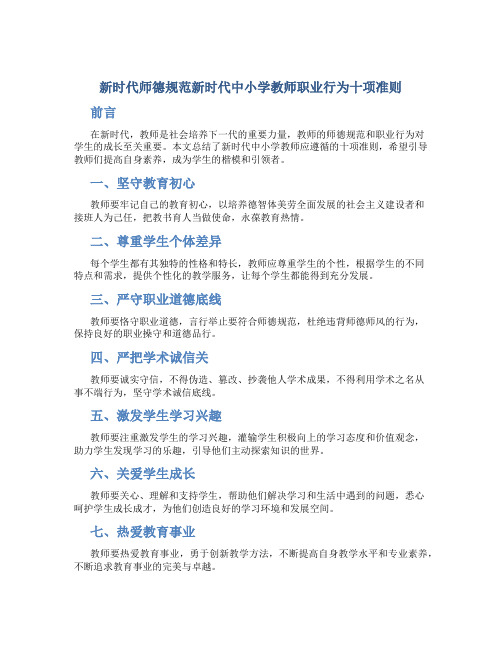
新时代师德规范新时代中小学教师职业行为十项准则前言在新时代,教师是社会培养下一代的重要力量,教师的师德规范和职业行为对学生的成长至关重要。
本文总结了新时代中小学教师应遵循的十项准则,希望引导教师们提高自身素养,成为学生的楷模和引领者。
一、坚守教育初心教师要牢记自己的教育初心,以培养德智体美劳全面发展的社会主义建设者和接班人为己任,把教书育人当做使命,永葆教育热情。
二、尊重学生个体差异每个学生都有其独特的性格和特长,教师应尊重学生的个性,根据学生的不同特点和需求,提供个性化的教学服务,让每个学生都能得到充分发展。
三、严守职业道德底线教师要恪守职业道德,言行举止要符合师德规范,杜绝违背师德师风的行为,保持良好的职业操守和道德品行。
四、严把学术诚信关教师要诚实守信,不得伪造、篡改、抄袭他人学术成果,不得利用学术之名从事不端行为,坚守学术诚信底线。
五、激发学生学习兴趣教师要注重激发学生的学习兴趣,灌输学生积极向上的学习态度和价值观念,助力学生发现学习的乐趣,引导他们主动探索知识的世界。
六、关爱学生成长教师要关心、理解和支持学生,帮助他们解决学习和生活中遇到的问题,悉心呵护学生成长成才,为他们创造良好的学习环境和发展空间。
七、热爱教育事业教师要热爱教育事业,勇于创新教学方法,不断提高自身教学水平和专业素养,不断追求教育事业的完美与卓越。
八、勇于自我反思教师要时刻反思自己的教育实践,审视自身的教学方法和效果,勇于接受他人的建议和批评,不断完善自我,提升教育教学质量。
九、团结协作互助教师要团结同事,积极参与学校集体活动,互帮互助,共同推动学校事业发展,形成助力团队壮大的良好氛围。
十、关心社会责任教师要关心社会大局,积极参与社会公益事业和志愿活动,传播正能量,成为社会主义核心价值观的践行者,以实际行动回报社会。
结语新时代中小学教师要以这十项准则为指南,不断提升自身素养和职业道德水平,积极引领学生,共同构建美好的教育生态,为培育社会主义建设者和接班人做出积极贡献。
新时代中小学教师职业行为十项准则是什么呢
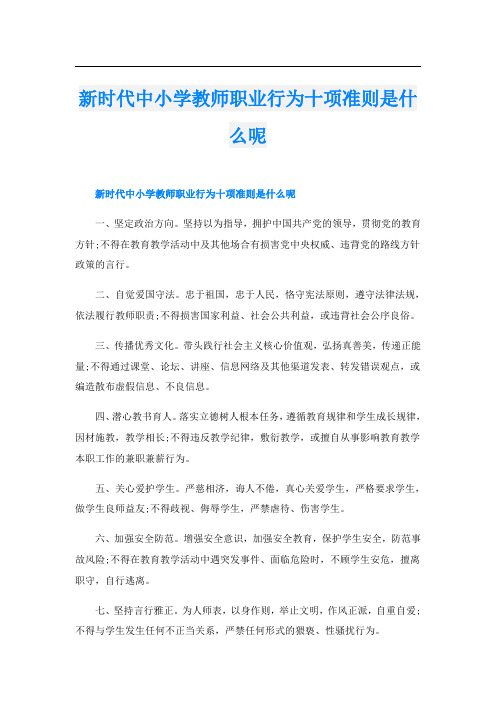
新时代中小学教师职业行为十项准则是什么呢新时代中小学教师职业行为十项准则是什么呢一、坚定政治方向。
坚持以为指导,拥护中国共产党的领导,贯彻党的教育方针;不得在教育教学活动中及其他场合有损害党中央权威、违背党的路线方针政策的言行。
二、自觉爱国守法。
忠于祖国,忠于人民,恪守宪法原则,遵守法律法规,依法履行教师职责;不得损害国家利益、社会公共利益,或违背社会公序良俗。
三、传播优秀文化。
带头践行社会主义核心价值观,弘扬真善美,传递正能量;不得通过课堂、论坛、讲座、信息网络及其他渠道发表、转发错误观点,或编造散布虚假信息、不良信息。
四、潜心教书育人。
落实立德树人根本任务,遵循教育规律和学生成长规律,因材施教,教学相长;不得违反教学纪律,敷衍教学,或擅自从事影响教育教学本职工作的兼职兼薪行为。
五、关心爱护学生。
严慈相济,诲人不倦,真心关爱学生,严格要求学生,做学生良师益友;不得歧视、侮辱学生,严禁虐待、伤害学生。
六、加强安全防范。
增强安全意识,加强安全教育,保护学生安全,防范事故风险;不得在教育教学活动中遇突发事件、面临危险时,不顾学生安危,擅离职守,自行逃离。
七、坚持言行雅正。
为人师表,以身作则,举止文明,作风正派,自重自爱;不得与学生发生任何不正当关系,严禁任何形式的猥亵、性骚扰行为。
八、秉持公平诚信。
坚持原则,处事公道,光明磊落,为人正直;不得在招生、考试、推优、保送及绩效考核、岗位聘用、职称评聘、评优评奖等工作中徇私舞弊、弄虚作假。
九、坚守廉洁自律。
严于律己,清廉从教;不得索要、收受学生及家长财物或参加由学生及家长付费的宴请、旅游、娱乐休闲等活动,不得向学生推销图书报刊、教辅材料、社会保险或利用家长资源谋取私利。
十、规范从教行为。
勤勉敬业,乐于奉献,自觉抵制不良风气;不得组织、参与有偿补课,或为校外培训机构和他人介绍生源、提供相关信息。
新时代中小学教师职业行为心得体会一、通过学习,我明白制定教师职业行为准则,明确新时代教师职业规范,针对主要问题、突出问题划定基本底线,是对广大教师的警示提醒和严管厚爱,是深化师德师风建设,造就政治素质过硬、业务能力精湛、育人水平高超的高素质教师队伍的关键之举,也为教师严格自我约束、规范职业行为、加强自我修养提供基本遵循。
新时代中小学教师职业行为十项准则
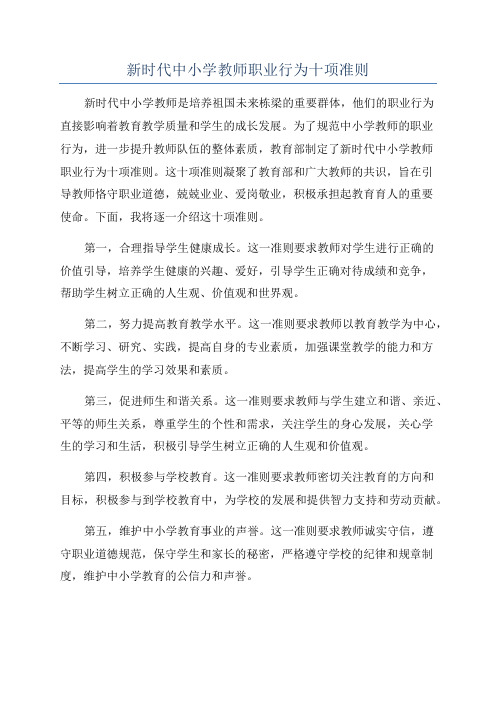
新时代中小学教师职业行为十项准则新时代中小学教师是培养祖国未来栋梁的重要群体,他们的职业行为直接影响着教育教学质量和学生的成长发展。
为了规范中小学教师的职业行为,进一步提升教师队伍的整体素质,教育部制定了新时代中小学教师职业行为十项准则。
这十项准则凝聚了教育部和广大教师的共识,旨在引导教师恪守职业道德,兢兢业业、爱岗敬业,积极承担起教育育人的重要使命。
下面,我将逐一介绍这十项准则。
第一,合理指导学生健康成长。
这一准则要求教师对学生进行正确的价值引导,培养学生健康的兴趣、爱好,引导学生正确对待成绩和竞争,帮助学生树立正确的人生观、价值观和世界观。
第二,努力提高教育教学水平。
这一准则要求教师以教育教学为中心,不断学习、研究、实践,提高自身的专业素质,加强课堂教学的能力和方法,提高学生的学习效果和素质。
第三,促进师生和谐关系。
这一准则要求教师与学生建立和谐、亲近、平等的师生关系,尊重学生的个性和需求,关注学生的身心发展,关心学生的学习和生活,积极引导学生树立正确的人生观和价值观。
第四,积极参与学校教育。
这一准则要求教师密切关注教育的方向和目标,积极参与到学校教育中,为学校的发展和提供智力支持和劳动贡献。
第五,维护中小学教育事业的声誉。
这一准则要求教师诚实守信,遵守职业道德规范,保守学生和家长的秘密,严格遵守学校的纪律和规章制度,维护中小学教育的公信力和声誉。
第六,积极参与社会服务和公益活动。
这一准则要求教师积极参加社会公益活动,帮助有需要的人们,参与社会事务和教育事业的发展,传递正能量,为社会进步贡献力量。
第七,加强与家长的沟通合作。
这一准则要求教师与学生家长保持密切的沟通,及时了解学生的家庭情况和需求,与家长建立良好的合作关系,形成家校共育的良好局面。
第八,尊重学识、尊重人才。
这一准则要求教师尊重同行的学识和专业,与同行共同学习和成长,相互促进,共同提高。
同时,教师要尊重学生的人才属性,认真对待每一个学生,发掘学生的潜能和特长,帮助学生全面发展。
中小学教师师德规范十项准则

中小学教师师德规范十项准则中小学教师是肩负着培养未来社会栋梁的重要使命的,他们的言行举止直接影响着学生的成长和未来。
为了规范中小学教师的师德行为,提高教育质量,以下是中小学教师师德规范的十项准则:1.爱岗敬业:中小学教师要热爱教育事业,忠诚于育人使命,兢兢业业、任劳任怨,不辞辛劳。
2.尊重学生:教师要尊重每一个学生的个性差异和发展规律,不歧视、不侮辱、不体罚学生,积极帮助学生解决成长中的问题。
3.严守纪律:教师要言行一致,遵守职业道德规范,不私自留学生作业、不泄露考试内容,不利用职权谋取私利。
4.关爱学生:教师要关心学生的成长和生活,倾听学生的心声,给予必要的帮助和关怀,塑造健康向上的学习氛围。
5.严于律己:教师要不断修炼自身,严格要求自己,保持良好的职业操守和精神状态,做学生的楷模和榜样。
6.热爱教学:教师要精益求精,不断提高教学水平,积极创新教学方法,激发学生学习的兴趣和潜能。
7.团结协作:教师要尊重同事,积极与同行交流合作,共同促进学校的发展和进步,形成良好的教师团队。
8.言传身教:教师要注重言传身教,言传主要是说话,身教主要是做事。
要以实际行动影响和感染学生,树立正确的道德观念。
9.独立自主:教师要独立思考,敢于创新,不囿于陈规陋习,勇于开拓进取,引领教育的变革与发展。
10.不断进取:教师要不断学习,追求专业知识的深造和拓展,不停止对教育的思考和探索,不断提高自身素质与能力。
这十项准则是中小学教师师德规范的基本要求,只有中小学教师严格遵守这些规范,才能成为合格的教育工作者,为学生的健康成长创造更好的教育环境。
愿每一位中小学教师时刻铭记这十项准则,不忘初心,牢记使命,将师德规范贯穿于教育教学的方方面面,为教育事业的蓬勃发展贡献自己的力量。
新时代中小学教师职业行为十项准则

新时代中小学教师职业行为十项准则1.坚守教育使命。
中小学教师要牢记自己的职责和使命,始终把培养优秀的社会主义建设者和接班人作为教育的根本目标,为学生的全面发展负责。
2.严守教育伦理。
教师应当以道德规范为准绳,倡导和践行社会主义核心价值观,成为学生良好品德的楷模,严禁任何形式的教育不当行为。
3.爱岗敬业。
教师要热爱教育事业,对学生充满爱心和耐心,把教育作为首要任务,执教敬业,为学生的学习和成长尽心尽力。
4.敬重学生人权。
教师应尊重学生的人权,包括尊重学生的人格尊严、隐私权和知情权等。
不得对学生进行任何形式的身体或心理上的伤害。
5.精心备课。
教师要根据教学大纲和教材要求,认真研究、准备教学内容,注重教学设计的合理性和科学性,确保课堂教学的有效性。
6.严谨治教。
教师要严肃工作纪律,维护课堂纪律,确保教学秩序正常运行。
对于学生的违纪行为,要及时、公正地进行处理。
7.注重个别差异。
教师要重视学生个体差异,尊重学生的兴趣、特长和潜能,努力提供差异化的教育,促进学生全面发展。
8.健康言行。
教师要以身作则,言行举止要健康、文明,杜绝不良习惯和不良行为,培养学生良好的行为习惯和道德品质。
9.不断专业成长。
教师要不断提高自己的教育教学水平,充实自己的学科知识和教育理论,积极参加各种培训和学习活动,不断提高自身素质和能力。
10.建立良好师生关系。
教师要尊重学生,与学生建立良好关系。
与此同时,要与家长保持密切沟通,形成良好的三方合作关系,共同关心孩子的学习和成长。
这十项准则是中小学教师在新时代应当遵守的职业行为规范。
教师作为社会主义建设的引领者,承载着培养下一代的使命,必须要以良好的职业行为为学生树立榜样。
这些准则旨在帮助教师做到真心实意为学生服务,注重个体差异,注重教育伦理和人权,不断提升自身素质和能力。
只有遵守这些准则,中小学教师才能成为学生学习和成长的引导者,为培养德智体美全面发展的社会主义建设者做出积极贡献。
- 1、下载文档前请自行甄别文档内容的完整性,平台不提供额外的编辑、内容补充、找答案等附加服务。
- 2、"仅部分预览"的文档,不可在线预览部分如存在完整性等问题,可反馈申请退款(可完整预览的文档不适用该条件!)。
- 3、如文档侵犯您的权益,请联系客服反馈,我们会尽快为您处理(人工客服工作时间:9:00-18:30)。
2013年12月大学英语四级考试真题(第二套)Part ⅠWriting (30 minutes) Directions:For this part, you are allowed 30 minutes to write a short essay based on the picture below. You should start your essay with a brief account of theincreasing use of the mobile phone in people’s life and then explain theconsequences of overusing it. You should write at least 120 words butno more than, 180 words.Part ⅡListening Comprehension (30 minutes) Section ADirections:In this section, you will hear 8 short conversations and 2 long conversations. At the end of each conversation, one or more questionswill be asked about what was said. Both the conversation and thequestions will be spoken only once. After each question there will be apause. During the pause, you must read the four choices marked A), B),C) and D), and decide which is the best answer. Then mark thecorresponding letter on Answer Sheet I with a single line through thecentre.1. A) Go to a place he has visited.B) Make her own arrangements.C) Consult a travel agent.D) Join in a package tour.2. A) They are on a long trip by car.B) They are stuck in a traffic jam.C) They are used to getting up early.D) They are tired of eating out at night.3. A) He is a person difficult to deal with.B) He dislikes any formal gathering.C) He is unwilling to speak in public.D) He often keeps a distance from others.4. A) Work in another department.B) Pursue further education.C) Recruit graduate students.D) Take an administrative job.5. A) He would not be available to start the job in time.B) He is not quite qualified for the art director position.C) He would like to leave some more time for himself.D) He will get his application letter ready before May 1.6. A) Cleaner.B) Mechanic.C) Porter.D) Salesman.7. A) Request one or two roommates to do the cleaning.B) Help Laura with her term paper due this weekend.C) Get Laura to clean the apartment herself this time.D) Ask Laura to put off the cleaning until another week.8. A) A problem caused by the construction.B) An accident that occurred on the bridge.C) The building project they are working on.D) The public transportation conditions.Questions 9 to 11 are based on the conversation you have just heard.9. A) To look for a job as a salesperson.B) To have a talk with Miss Thompson.C) To place an order for some products.D) To complain about a faulty appliance.10. A) The person in charge is not in the office.B) The supplies are out of stock for the moment.C) They failed to reach an agreement on the price.D) The company is re-cataloguing the items.11. A) 0743, 12536 extension 15.B) 0734, 21653 extension 51.C) 0734, 38750 extension 15.D) 0743, 62135 extension 51.Questions 12 to 15 are based on the conversation you have just heard.12. A) Since he found a girlfriend.B) Since he took to heavy smoking.C) Since he began to exercise regularly.D) Since he started to live on his own.13. A) He is getting too fat.B) He smokes too much.C) He doesn’t eat vegetables.D) He doesn’t look well at all.14. A) They are overweight for their age.B) They are respectful to their parents.C) They are still in their early twenties.D) They dislike doing physical exercise.15. A) To quit smoking.B) To reduce his weight.C) To find a girlfriend.D) To follow her advice.Section BDirections: In this section, you will hear 3 short passages. At the end of each passage, you will hear some questions. Both the passage and the questions will bespoken only once. After you hear a question, you must choose the bestanswer from the four choices marked A), B), C) and D). Then mark thecorresponding letter on Answer Sheet I with a single line through thecentre.Passage OneQuestions 16 to 19 are based on the passage you have just heard.16. A) They have destroyed several small towns.B) They will soon spread to San Francisco.C) They have injured many residents.D) They are burning out of control.17. A) They have been hospitalized.B) They have got skin problems.C) They were choked by the thick smoke.D) They were poisoned by the burning chemical.18.A) It failed because of a sudden rocket explosion.B) It has been scheduled for a midday takeoff.C) It has been canceled due to technical problems.D) It was delayed for eleven hours and thirty minutes.19. A) They made frequent long, distance calls to each other.B) They illegally used government computers in New Jersey.C) They were found to be smarter than computer specially.D) They were arrested for stealing government information.Passage TwoQuestions 20 to 22 are based on the passage you have just heard.20. A) Peaceful.B) Considerate.C) Generous.D) Cooperative.21. A) Someone dumped the clothes left in the washer and dryer.B) Someone broke the washer and dryer by overloading them.C) Mindy Lance’s laundry blocked the way to the laundry room.D) Mindy Lance threatened to take revenge on her neighbors.22. A) Asking the neighborhood committee for help.B) Limiting the amount of laundry for each wash.C) Informing the building manager of the matter.D) Installing a few more washers and dryers.Passage ThreeQuestions 23 to 25 are based on the passage you have just heard.23. A) She is both a popular and highly respected author.B) She is the most love African novelist of all times.C) She is the most influential author since the 1930’s.D) She is the first writer to focus on the fate of slaves.24. A) The Book Critics Circle Award.B) The Nobel Prize for literature.C) The Pulitzer Prize for fiction.D) The National Book Award.25. A) She is a relative of Morrison’s.B) She is a slave from Africa.C) She is a skilled storyteller.D) She is a black woman.Section CDirections:In this section, you will hear a passage three times. When the passage is read for the first time, you should listen carefully for its general idea.When the passage is read for the second time, you are required to fill inthe blanks with the exact words you have just heard. Finally, when thepassage is read for the third time, you should check what you havewritten.Many college students today own personal computers that cost anywhere from $1,000 to perhaps $5,000 or more. 26 , it is not uncommon for them to purchase 27 costing another several hundred dollars, Twenty years ago, computers were 28 , but they were very large and extremely expensive. Few, if any, 29 purchased computers for home use. Over the years the price of the “guts”of a computer—its memory—has declined to less than a thousandth of the price per unit of memory that prevailed twenty years ago. This is the main reason why computers cost so much less today than they used to. Moreover, 30 improvements have made it possible to 31 memory circuitry that is small enough to fit into the portable personal computers that many of us own and use. 32 , as the price of computation has declined the average consumer and business have spent more on purchasing computers.33 , improved agricultural technology, hybrid(杂交) seeds, 34 animal breeding, and so on have vastly increased the amount of output a typical farmer can produce. The prices of goods such as meats and grains have fallen sharply relative to the prices of most other goods and services. As agricultural prices have fallen, many households have decreased their total expenses on food. Even though the 35 of a product purchased generally increase when its price falls, total expenses on it may decline.Part ⅢReading Comprehension (40 minutes) Section ADirections: In this section, there is a passage with ten blanks. You are required to select one word for each blank from a list of choices given in a wordbank following the passage: Read the passage through carefully beforemaking your choices. Each choice in the bank is identified by a letter.Please mark the corresponding letter for each item on Answer Sheet 2with a single line through the centre. You may not use any of the words inthe bank more than once.Questions 36 to 45 are based on the following passage.To get a sense of how women have progressed in science, take a quick tour of the physics department at the University of California, Berkeley. This is a storied place, the 36 of some of the most important discoveries in modern science—starting with Ernest Lawrence’s invention of the cyclotron (回旋加速器) in 1931. A generation ago, female faces were 37 and, even today, visitors walking through the first floor of LeConte Hall will see a full corridor of exhibits 38 the many distinguished physicists who made history here, 39 all of them white males.But climb up to the third floor and you’ll see a 40 display. There, among the photos of current faculty members and students, are portraits of the 41 head of the department, Marjorie Shapiro, and four other women whose research 42 everything from the mechanics of the universe to the smallest particles of matter. A sixth woman was hired just two weeks ago. Although they’re still only about 10 percent of the physics faculty, women are clearly a presence here. And the real 43 may be in the smaller photos to the right: graduate and undergraduate students, about 20 percent of them female. Every year Berkeley sends its fresh female physics PhDs to the country’s top universities. That makes Shapiro optimistic, but also 44 . “I believe things are getting better,” she says, “but they’re not getting better as 45 asSection BDirections: In this section, you are going to read a passage with ten statements attached to it. Each statement contains information given in one of theparagraphs. Identify the paragraph from which the information isderived. You may choose a paragraph more than once. Each paragraphis marked with a letter. Answer the questions by marking thecorresponding letter on Answer Sheet 2.Is College a Worthy Investment?[A] Why are we spending so much money on college? And why are we so unhappyabout it? We all seem to agree that a college education is wonderful, and yet strangely we worry when we see families investing so much in this supposedly essential good. Maybe it’s time to ask a question that seems almost sacrilegious (大不敬): is all this investment in college education really worth it?[B] The answer, I fear, is no. For an increasing number of kids, the extra time andmoney spent pursuing a college diploma will leave them worse off than they were before they set foot on campus.[C] For my entire adult life, a good education has been the most important thing formiddle-class households. My parents spent more educating my sister and me than they spent on their house, and they’re not the only ones...and, of course, for an increasing number of families, most of the cost of their house is actually the cost of living in a good school district. Questioning the value of a college education seems a bit like questioning the value of happiness, or fun.[D] The average price of all goods and services has risen about 50 percent. But theprice of a college education has nearly doubled in that time. Is the education that today’s students are getting twice as good? Are new workers twice as smart?Have they become somehow massively more expensive to educate?[E] Perhaps a bit. Richard Vedder, an Ohio University economics professor, says, “Ilook at the data, and I see college costs rising faster than inflation up to the mid-1980s by 1 percent a year. Now I see them rising 3 to 4 percent a year over inflation. What has happened? The federal government has started dropping money out of airplanes.”Aid has increased, subsidized(补贴的) loans have become available, and “the universities have gotten the money.” Economist Bryan Caplan, who is writing a book about education, agrees: “It’s a giant waste of resources that will continue as long as the subsidies continue.”[F] Promotional literature for colleges and student loans often speaks of debt as an“investment in yourself.” But an investment is supposed to generate income to pay off the loans. More than haft of all recent graduates are unemployed or in jobs that do not require a degree, and the amount of student- loan debt carried byhouseholds has increased more than five times since 1999. These graduates were told that a diploma was all they needed to succeed, but it won’t even get them out of the spare bedroom at Mom and Dad’s. For many, the most visible result of their four years is the loan payments, which now average hundreds of dollars a month on loan balances in the tens of thousands.[G] It’s true about the money—sort of. College graduates now make 80 percent morethan people who have only a high-school diploma, and though there are no precise estimates, the wage premium (高出的部分) for an outstanding school seems to be even higher. But that’s not true of every student. It’s very easy to spend four years majoring in English literature and come out no more employable than you were before you went in. Conversely, chemical engineers straight out of school can easily make almost four times the wages of an entry-level high-school graduate.[H] James Heckman, the Nobel Prize-winning economist, has examined how thereturns on education break down for individuals with different backgrounds and levels of ability. “Even with these high prices, you’re still finding a high return for individuals who are bright and motivated,”he says. On the other hand, “if you’re not college ready, then the answer is no, it’s not worth it.” Experts tend to agree that for the average student, college is still worth it today, but they also agree that the rapid increase in price is eating up more and more of the potential return. For borderline students, tuition(学费) rise can push those returns into negative territory.[I] Everyone seems to agree that the government, and parents, should be rethinkinghow we invest in higher education—and that employers need to rethink the increasing use of college degrees as crude screening tools for jobs that don’t really require college skills, “Employers seeing a surplus of college graduates and looking to fill jobs are just adding that requirement,”says Vedder. “In fact, a college degree becomes a job requirement for becoming a bar-tender.”[J] We have started to see some change on the finance side. A law passed in 2007 allows many students to cap their loan payment at 10 percent of their income and forgives any balance after 25 years. But of course, that doesn’t control the cost of education; it just shifts it to taxpayers. It also encourages graduates to choose lower-paying careers, which reduces the financial return to education still further.“You’re subsidizing people to become priests and poets and so forth,”saysHeckman. “You may think that’s a good thing, or you may not.” Either way it will be expensive for the government.[K] What might be a lot cheaper is putting more kids to work. Caplan notes that work also builds valuable skills—probably more valuable for kids who don’t naturally love sitting in a classroom. Heckman agrees wholeheartedly: “People are different, and those abilities can be shaped. That’s what we’ve learned, and public policy should recognize that.”[L] Heckman would like to see more apprenticeship-style (学徒式) programs, where kids can learn in the workplace learn not just specific job skills, but the kind of “soft skills”, like getting to work on time and getting along with a team, that are crucial for career success. “It’s about having mentors(指导者) and having workplace-based education,” he says. “Time and again I’ve seen examples of this kind of program working.”[M] Ah, but how do we get there from here? With better public policy, hopefully, but also by making better individual decisions. “Historically markets have been able to handle these things,” says Vedder, “and I think eventually markets will handle this one. If it doesn’t improve soon, people are going to wake up and ask, ‘Why am I going to college?’”注意:此部分试题请在答题卡2上作答。
